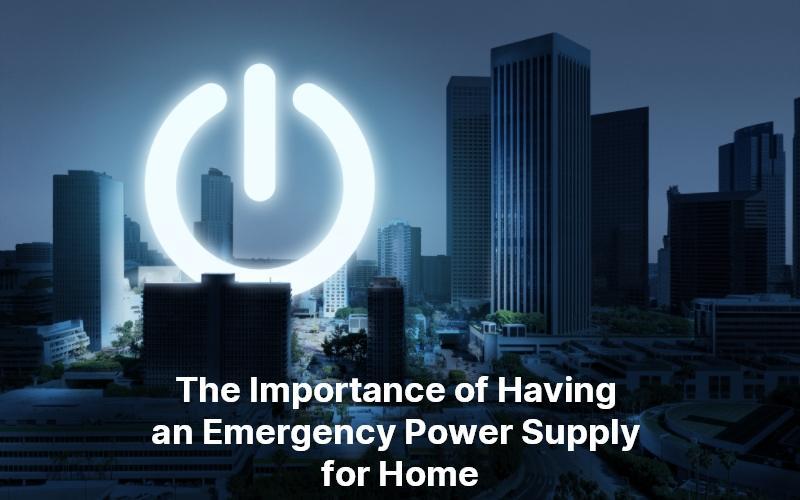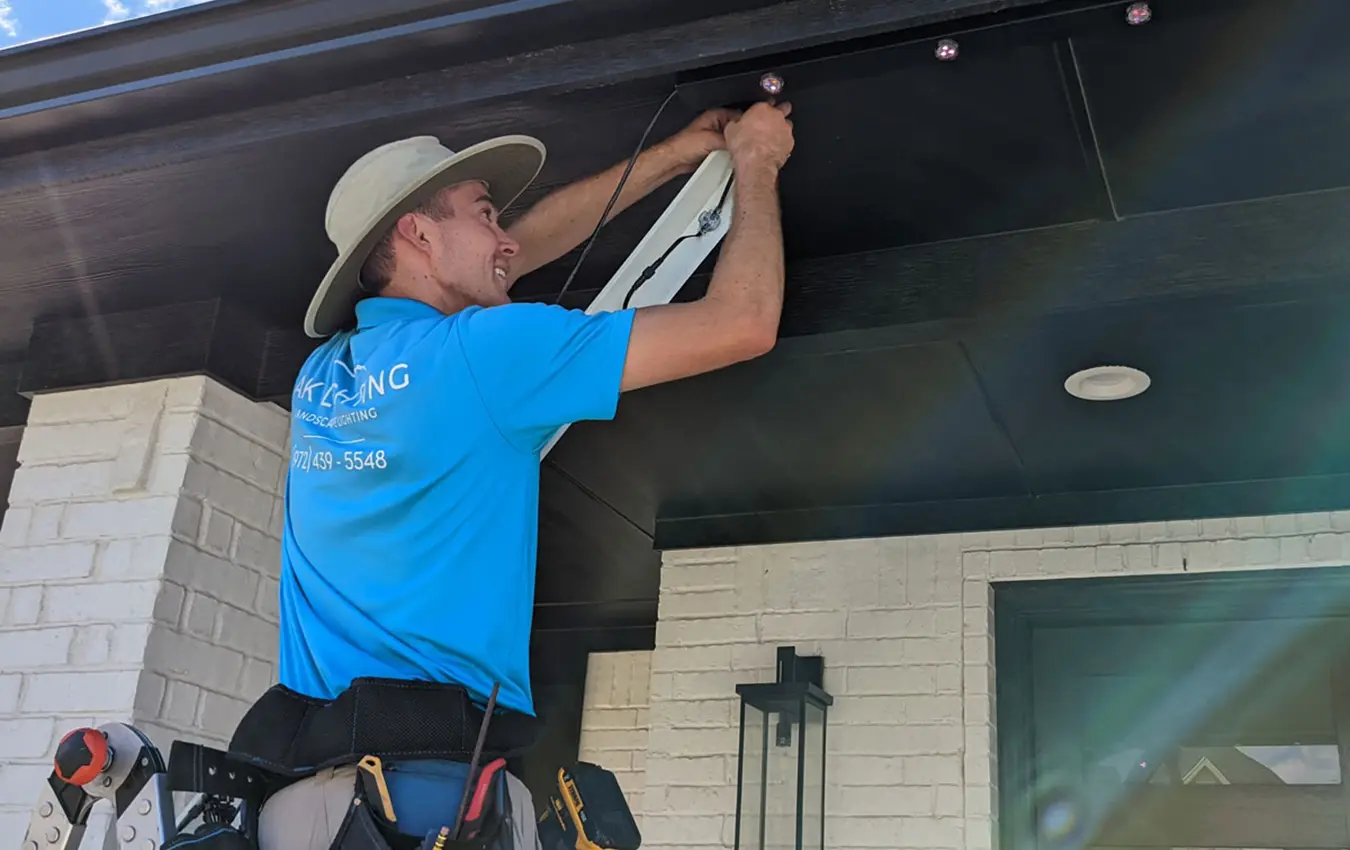Power outages can be inconvenient and even dangerous, especially if they last for an extended period of time. An emergency power supply can provide peace of mind and keep your home and family safe during these situations. Learn about the different types of emergency power supplies available and how to select the best one for your needs.
Why an emergency power supply is important.
An emergency power supply is important for several reasons. Foremost, it can keep your home and family safe during power outages. It can power essential appliances like refrigerators, freezers, and medical equipment, ensuring that your family has access to food and necessary medical care. Additionally, it can provide comfort during extreme temperatures, such as heat waves or cold snaps. Finally, an emergency power supply can also protect your home from damage caused by power surges or other electrical issues that can occur during power outages.
Investing in an emergency power supply for your home is a smart decision, especially if you live in an area prone to power outages or extreme weather conditions. With a backup power source, you can rest assured that your family will be safe and comfortable during emergencies. It’s important to choose a reliable and efficient system that can power essential appliances and devices for an extended period of time. Consider factors such as fuel type, capacity, and ease of use when selecting an emergency power supply for your home. With the right system in place, you can have peace of mind knowing that you’re prepared for any unexpected power outage or emergency.
Types of emergency power supplies.
There are several types of emergency power supplies available on the market. The most common types include portable generators, standby generators and solar power systems. Portable generators are the most affordable option and can be easily moved from one location to another. Standby generators are pricier but provide a more permanent solution, as they are installed directly into your home’s electrical system. Solar power systems are a renewable energy option that can be used to power your home during power outages. When choosing an emergency power supply, consider factors such as cost, fuel source, and power output to determine which type is best for your needs.
Portable generators are a popular choice for emergency power supplies because they are affordable and easy to use. These generators can be powered by gasoline, propane, or diesel fuel and can provide enough power to run essential appliances such as refrigerators, lights, and fans. However, they do require regular maintenance and fuel refills, which can be inconvenient during extended power outages.
To learn more about the emergency power options, Premier Electrical Services has to offer to keep your home safe and secure, please contact us at phone: 954-900-1696 or send an application for a quote.
Factors to consider when selecting an emergency power supply.
When deciding on an emergency power supply for your home, there are several factors to consider. First, consider the cost of the system, including installation and maintenance expenses. Next, consider the fuel source for the system, whether it be gasoline, propane, or solar power. You should also consider the power output of the system, which will determine how many appliances and devices you can power during an outage. Other factors to consider include noise level, portability, and ease of use.
One of the most important factors to consider when choosing an emergency power supply for your home is the cost. You should consider not only the initial cost of the system, but also the cost of installation and maintenance. Some systems may require professional installation, which can add to the overall cost. Additionally, you should consider the fuel source for the system. Gasoline and propane generators are common options, but solar power systems are becoming increasingly popular. The power output of the system is also important, as it will determine how many appliances and devices you can power during an outage. Noise level, portability, and ease of use are also important factors to consider. By carefully considering these factors, you can select an emergency power supply that meets your needs and provides peace of mind during power outages.
Emergency Power Supply for Your Home Based on a Stationary Standby Generator
When it comes to emergency power supply for your home, a permanently installed generator is a reliable option. These generators can last for 15 to 20 years, with engines that can run for up to 3,000 hours. To ensure that your generator is ready when you need it, most installers offer annual service contracts that include oil and air filter changes, starter battery checks, and system testing. Some generators even automatically run for a few minutes each week to keep the oil circulating and the battery charged. Keep in mind that during these times, no power is fed to the house.
It’s critical to think about safeguarding your electronics from voltage fluctuations when planning an emergency power supply for your home. An electronic voltage regulator can help prevent damage to your devices by stabilizing the electric current. This is especially important during power outages or other emergencies when the electrical grid may be unstable.
It’s crucial to think about accessibility for maintenance when choosing an emergency power supply for your home. This means selecting a system that is easy to access and maintain so that you can quickly and easily address any issues that may arise. Whether you opt for a generator or a battery backup system, make sure that it is designed with maintenance in mind, and that you have the tools and knowledge necessary to keep it running smoothly.
Premier Electrical Services is installing an emergency power supply with a Generac standby generator.
To find out what kind of backup generator you need for your home is to request an individual quote for you. Call to learn more by phone 954-900-1696 or request your free quote
Sizing a Standby Generator
When considering an emergency power supply for your home, it’s important to determine the size of generator you’ll need. Start by making a list of all the appliances you’ll need during an outage and add up their surge watts, which is the amount of electricity a motor needs to start. Don’t forget to include the run watts for electrical items without motors, such as lightbulbs, water heaters, and televisions. Once you have this total, add a 10 to 20 percent safety margin and then divide by 1,000 to determine the kilowatt rating you should look for in a generator. This will ensure that you have enough power to keep your essential appliances running during an emergency.
It’s important to calculate the right size standby generator when it comes to choosing an emergency power supply for your home. Ron Ford, a sales manager at Generac, recommends selecting a generator that can handle emergency power demand while running at ? to ? of its maximum load. This not only reduces fuel consumption, but also minimizes wear and tear on the engine. By following this calculation, you can ensure that your home will have a reliable source of backup power during emergencies.
Maintaining an emergency power supply for your home is crucial in case of power outages or other emergencies. One option is a generator, which can provide electricity to your home when the main power source is down. However, it’s important to regularly maintain your generator to ensure it’s in good working condition when you need it most. This includes checking the oil and fuel levels, testing the battery, and inspecting the spark plugs. By keeping up with generator maintenance, you can have peace of mind knowing you have a reliable backup power source.
The Noise Level of an External Backup Generator
To properly arrange an emergency power supply at home, it is important to consider the noise level of an external backup generator to obtain an acceptable noise level. Look for a weatherproof and insulated housing that can help dampen the engine noise. According to Ford, smaller units with a capacity of 8.5 to 11 kW are generally quieter, while larger generators tend to be much noisier. Keep this in mind when selecting a generator for your home.
Having an emergency power supply for your home can provide peace of mind during unexpected power outages. While there may be minor inconveniences such as noise and occasional maintenance, many homeowners feel that it’s worth it to have a reliable backup source of electricity.
The All-Important Transfer Switch
In the event of a power outage, having an emergency power supply for your home can be a lifesaver. One option is a manual transfer switch, which isolates your house from the incoming power lines and requires you to start the generator yourself. However, for an additional cost of around $1,000, an automatic transfer switch can do all the work for you. This device constantly monitors incoming power and will automatically isolate your house and start the generator if it detects an interruption or voltage reduction. The process typically takes 10 to 20 seconds, allowing for a brief period of darkness before the generator kicks in. The transfer switch also waits to see if the power will come back on before shutting down the generator, preventing it from cycling on and off unnecessarily. Overall, investing in an emergency power supply with an automatic transfer switch can provide peace of mind and convenience during power outages.
Required Standby Generator Capacity
When selecting an emergency power supply for your home, it’s important to determine your household’s electricity needs. This will help you determine the appropriate generator output size. For example, smaller 4- to 8-kw generators can power essential appliances and lighting, while larger 25-kw generators can power an entire household. A 10- to 15-kw generator is typically sufficient for most residences, including energy-intensive appliances like water heaters and air conditioners. To manage power needs and generator size, an essential-loads distribution panel is necessary. This panel only connects circuits that require emergency power and receives power from the generator during an outage, reverting to utility power once the outage is over.
Estimated Cost of an Emergency Power Supply Device for a Home
A permanently installed generator is a convenient option for your home’s emergency power supply, but it has a high cost. The cost starts at around $3,000 for smaller 6-8 kW models and can go up to $5,000-$10,000 for larger 11-20 kW units. Moreover, installation can cost anywhere from $800 to $2,500, which includes pouring a concrete pad, wiring, and installing a fuel line and tank. It’s important to coordinate with a dealer, which can be found in the yellow pages or through manufacturer websites. Additionally, there are ongoing costs for maintenance and fuel to consider.
How to Determine the Allowable Dimensions of an Emergency Backup Generator for a Home
It’s crucial to pick a generator that is the right size for your needs when it comes to emergency power supply for your home. Experts recommend selecting a unit that can deliver 10 to 20 percent more power than your total expected demand. This ensures that the generator won’t be overtaxed, which can reduce fuel efficiency and cause the engine to run harder. In fact, running a generator too close to its rated output can even cause its breakers to trip, which can lead to overheating. As Ron Ford, sales manager at Kohler, warns, “A generator that’s too small is worse than not having any power at all.”
When it comes to choosing an emergency power supply for your home, it’s important to consider the size of the generator you’ll need. Factors such as the size of your home, the number of appliances you want to power, and the length of time you’ll need the generator to run will all play a role in determining the appropriate size. Use a sizing chart to help you make an informed decision and ensure that you have the backup power you need in case of an emergency. Contact us today to learn more about our emergency power supply services and how we can help protect your home and family during power outages.
Benefits of having an emergency power supply for your home.
There are many benefits to having an emergency power supply for your home. First, it can provide peace of mind knowing that you and your family will have access to power during an outage. This can be especially important if you have medical equipment that requires electricity or if you live in an area prone to severe weather. Additionally, having an emergency power supply can help prevent food spoilage and damage to electronics and appliances. It can also increase the value of your home and potentially lower your insurance premiums. Overall, investing in an emergency power supply is a smart decision for any homeowner looking to protect their property and loved ones.
One of the biggest benefits of having an emergency power supply for your home is the peace of mind it provides. During a power outage, you won’t have to worry about being without electricity for an extended period of time. This is especially important if you have medical equipment that requires electricity, such as a CPAP machine or oxygen concentrator. An emergency power supply can also help prevent food spoilage and damage to electronics and appliances, which can save you money eventually. Additionally, having an emergency power supply can increase the value of your home and potentially lower your insurance premiums. Overall, investing in an emergency power supply is a smart decision for any homeowner looking to protect their property and loved ones.
Premier Electrical Services: Installation and maintenance of an emergency power supply.
Premier Electrical Services offers installation and maintenance services for emergency power supplies for your home. Our team of experienced electricians can help you choose the best system for your needs and ensure that it is installed correctly and safely. We also offer regular maintenance services to ensure that your system is always in top working condition and ready to use in case of an emergency.
At Premier Electrical Services we understand the importance of having a reliable emergency power supply for your home. Power outages can happen at any time, and having a backup system in place can provide peace of mind and ensure that your family is safe and comfortable. Our team can help you select the best system for your needs, whether it be a generator or battery backup, and ensure that it is installed correctly and safely. We also offer regular maintenance services to ensure that your system is always in top working condition and ready to use in case of an emergency.
If you’re looking for a reliable power supply for your home, consider a Generac generator installed by Premier Electrical Services.
Don’t wait until it’s too late – Contact us today at 954-900-1696 to learn more about our emergency power supply services and how we can help protect your home and family.
Check out the latest news:
- 5 Smart Home Upgrades to Increase Property Value in Fort Lauderdale
- Common Lighting Issues and How Professional Repairs Can Save You Money
- Smart Lighting Solutions for Energy Efficiency in Fort Lauderdale Homes
- The Latest Trends in Outdoor Lighting for 2024: Illuminating the Future
- Upgrading Your Home’s Electrical Panel: What You Need to Know






